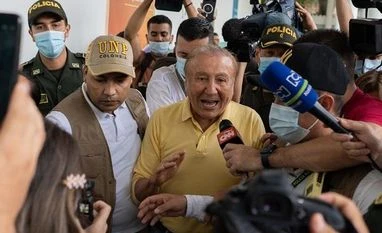A construction magnate who was little known at the start of the year has surged into Colombia’s runoff election with a real chance at winning the presidency as voters coalesce against his leftist rival.
Rodolfo Hernandez got 28% of votes, compared to 40% for former guerrilla Gustavo Petro, the electoral authority said Sunday night after an election in which no candidate reached the 50% threshold to avoid a second round.
Federico Gutierrez, who polls showed was Petro’s main rival, only got 24%. He and many of his key supporters have already endorsed Hernandez. Hernandez, Gutierrez and center candidate Sergio Fajardo between them got about 12 million votes, compared to 8.5 million for Petro, potentially giving the businessman the upper hand in the runoff.
“Most of Gutierrez’s backers will go for Rodolfo,” said Sergio Guzman, director of Colombia Risk Analysis. “What becomes critical now is for Hernandez to start putting a team together and start naming possible cabinet members.”
While Petro has been mayor of Bogota, senator and has run for president before, Hernandez is far less well known, and his stance on many issues is still unclear.
Hernandez, 77, made a fortune building homes for low-income families and was mayor of the provincial city of Bucaramanga. He’s been compared to former US President Donald Trump for his brash and unpredictable style.
“Today, the country of dirty politics and corruption lost,” Hernandez said, speaking by live video from his kitchen in his home town of Bucaramanga.
His campaign team built a successful social media strategy driven by TikTok videos espousing his simple message that Colombia is being bled white by corrupt politicians who should be in jail. He’s yet to say who would lead his economic team, or provided specifics on key issues.
The result is still highly uncertain, and several polls before the first round showed Petro winning the runoff.
In a speech to supporters in Bogota, Petro said he’s one million votes away from the presidency. He attacked Hernandez, saying “You don’t end corruption by talking on TikTok.”
Market Reaction
Colombian assets are likely to rally when markets reopen on Tuesday after a public holiday, said Andres Pardo, chief Latin America macro strategist at XP Investments in New York.
“Investors are mainly worried about the chance of a Petro victory, so they’ll view positively any scenario in which he doesn’t win,” Pardo said. “But the truth is that with Rodolfo Hernandez, there’s a huge question mark.”
Gustavo Petro, presidential candidate of the Colombia Humana party, casts a ballot at a polling location during the first-round presidential election in Bogota, Colombia. (Photo: Bloomberg)
Petro, 62, wants to tax wealthy landowners, halt the awarding of oil exploration licenses and restore ties with the socialist government of Venezuela. He was a member of an illegal guerrilla group in his late teens and twenties before getting into politics.
The runoff is set for June 19 and the new president will take office on Aug. 7.
Denounced as Crooks
Hernandez currently has few allies in congress, and to govern he’ll need to gain the support of the very lawmakers he has denounced as crooks. Petro also lacks a majority, and would need to reach out to centrist parties in order to pass laws.
Colombia has long been the strongest ally of the US in the region. The US government would prefer to work with Hernandez than with Petro, “but it will still be a very bumpy ride,” said Adam Isacson of the Washington Office on Latin America, which studies human rights in the region.
A Petro win, on the other hand, is likely to mean “tensions in the relation for the entire term, going from drug policy to Petro’s ties with traditional enemies of the US,” he said.
“For the first time since the late 90’s you’ll have a government in Bogota that is willing to place less value on the relations with the US and say no more often,” Isacson said. “From the Pentagon’s perspective, any distance between the US and its closest ally in the hemisphere, gives an advantage to other great powers like China and Russia.”
Petro wants to restore full diplomatic relations with neighboring Venezuela, while Hernandez says he wants to reestablish commercial relations.
Economic Recovery
Colombian voters made clear their desire for change by rejecting candidates supported by more traditional parties. While Colombia’s economy has rebounded strongly, the pandemic aggravated deep inequality in the South American country and voters are upset about issues including inflation, unemployment and corruption.
Federico Gutierrez at an election night rally in Bogota, Columbia. (Photo: Bloomberg)
The next president will inherit an economy that is set to grow 5.8% this year, the fastest among major economies in the Americas, according to forecasts from the International Monetary Fund.
At the same time, inflation is running at a 21-year-high of 9.2%, led by a spike in food and energy costs which is particularly hitting poorer families.
“Rodolfo has a very good chance to unite voters, all those that want a change but not with the left,” said Silvana Amaya, an analyst at Control Risks consultancy in Bogota. “He has better chances of beating Petro in a runoff than any other candidate would have had.”
Unlock 30+ premium stories daily hand-picked by our editors, across devices on browser and app.
Pick your 5 favourite companies, get a daily email with all news updates on them.
Full access to our intuitive epaper - clip, save, share articles from any device; newspaper archives from 2006.
Preferential invites to Business Standard events.
Curated newsletters on markets, personal finance, policy & politics, start-ups, technology, and more.
)